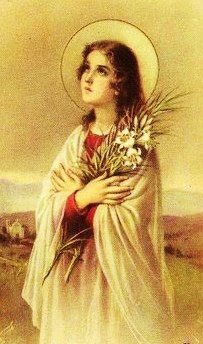Maria Goretti was born in 1890 in Corinaldo, in the Ancona Province in Italy to a farming family. Her father died when she was still a girl, which left her mother along with her and her brothers and sisters to keep the farm going. Maria’s responsibility included cooking and keeping house along with preparing meals for everyone.
It was on July 5, 1902, that Maria was sitting outside the steps of her home mending a shirt while one of the neighboring young men named Alessandro was working in the barnyard. Everyone else was working in the fields. As she concentrated on her sewing, Alessandro surprised her and grabbed her from her steps. When he tried to rape her, Maria cried that it was a mortal sin and warned he would go to hell.
When Alessandro persisted, she fought him and begged him to stop, telling him over and over again that he was committing a sin. Alessandro began to choke her and pulled out a knife and stabbed her eleven times. When she attempted to reach the door, he stabbed her three more times then fled.
Maria's family returned home and found her bleeding on the floor. They quickly took her to the nearest hospital but it was too late to save her.
As she lay dying, Maria forgave Alessandro and said she wanted to see him in Heaven with her. She died that day while looking upon an image of the Virgin Mary and holding a cross to her chest.
Alessandro remained unrepentant for his actions until he had a dream that he was in a garden. Maria was there and gave him lilies, which immediately burned in his hands. When he woke, he was a changed man. He repented his crime and living a reformed life. When he was released 27 years later, he went directly to Maria's mother and begged her forgiveness, which she gave.
Maria Goretti was beatified in 1947, and three years later Maria was declared a saint and Alessandro was present at her canonization. He later became a lay brother of the Order of Friars Minor Capuchin, where he lived in a monastery and worked as its receptionist and gardener until his death.
Saint Maria is called a martyr because she fought against Alessandro's attempts at sexual sin; however, the most important aspects of her story are how she forgave her attacker – and her forgiveness brought about his conversion.
These words are from the homily of Venerable Pope Pius XII at her canonization:
"It is well known how this young girl had to face a bitter struggle with no way to defend herself. Without warning a vicious stranger burst upon her, bent on raping her and destroying her childlike purity. In that moment of crisis she could have spoken to her Redeemer in the words of that classic, The Imitation of Christ: “Though tested and plagued by a host of misfortunes, I have no fear so long as your grace is with me. It is my strength, stronger than any adversary; it helps me and give me guidance.” With splendid courage she surrendered herself to God and his grace and so gave her life to protect her virginity. The life of a simple girl - I shall concern myself only with highlights - we can see as worthy of heaven. Even today people can look upon it with admiration and respect. Parents can learn from her story how to raise their God-given children in virtue, courage, and holiness; they can learn to train them in the Catholic faith so that, when put to the test, God’s grace will support them and they will come through undefeated, unscathed, and untarnished. From Maria’s story carefree children and young people with their zest for life can learn not to be led astray by attractive pleasures which are not only ephemeral and empty but also sinful. Instead they can fix their sights on achieving Christian moral perfection, however difficult that course may prove. With determination and God’s help all of us can attain that goal by persistent effort and prayer. Not all of us are expected to die a martyr’s death, but we are all called to the pursuit of Christian virtue. So let us all, with God’s grace, strive to reach the goal that the example of the virgin martyr, Saint Maria Goretti, sets before us. Through her prayers to the Redeemer may all of us, each in his own way, joyfully try to follow the inspiring example of Maria Goretti who now enjoys eternal happiness in heaven."
O God, the author of innocence and lover of chastity, who didst bestow the grace of martyrdom on thy handmaid, the Virgin Saint Maria Goretti, in her youth: grant, we pray, through her intercession; that, as thou gavest her a crown for her steadfastness, so we too may be firm in obeying thy commandments; through Jesus Christ thy Son our Lord, who liveth and reigneth with thee, in the unity of the Holy Spirit, ever one God, world without end. Amen.



















